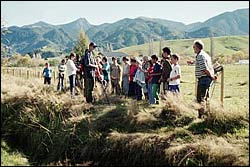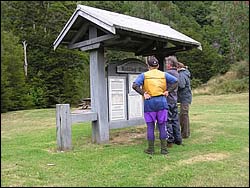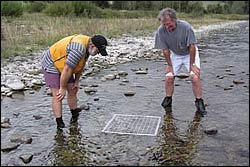Knowledge interactions
Research Status: Ongoing |
Ngatimoti School go electric fishing |
Introduction
In many of the areas that Landcare Research works in, such as catchment management, there is often a major challenge to raise awareness of the role of science in decision making. In addition to this, decision making in such areas are characterised by many different stakeholders and multiple social perspectives of the issues and potential solutions. Often too, progress can only be made by a number of stakeholders working together across a range of decision making levels. This work in the ICM Motueka programme is looking to develop and evaluate methods to improve learning-based and collaborative approaches to support and ultimately improve resource management planning and policy.
Research Approach
Develop and refine participatory processes that improve social learning and co-ordinated environmental action, with particular attention to improving the uptake of research information. This involves working through case studies in two main areas:
- Improving interactions and linkages between science and end users, including establishing how the Internet can support improved information flows.
- Working with agencies to improve the wider social environment for the uptake of science information.
Research Results
A community reference group (CRG) was established in the first year of the programme, and four meetings have been had between ICM programme staff and the CRG. This group has been set up as a touchstone as to community interests, and members are charged to bring a range of views, rather than to represent any one group. Will Allen and Maregaret Kilvington co-ordinated the development of terms of reference for the CRG, and have facilitated the meetings. A rationale and approach for stakeholder analysis has been developed, and programme leaders were involved in the first step of this last year.
A number of workshops and meetings have contributed to the development of approaches and processes needed for social learning and improved uptake of science. Methodologies for evaluation have been identified. Initial meetings have been held with TDC staff to explore future directions for joint work in this area. Identified areas for work include how to build better linkages between different stakeholder groups in the catchment, and how to improve the use of science within TDC.
The work carried out to date has established good links with the TDC and several stakeholder groups and individuals. Frameworks and evaluative research approaches have been identified. Links have been made with key partners who will contribute to this research across a number of areas - including local government and MFE.
This general framework has been documented in reports for MAF and MFE. A collaborative learning site on the Landcare website has been developed to bring our existing knowledge in this area together and as a vehicle for documenting future lessons. A mailing list of key stakeholder groups is being collated to help dissemination of results.
The outcome should be increased responsiveness of the ICM science programme and improved processes for collaboration and social learning in catchment management that is being used in the Tasman District. The lessons should be documented and available for use by other key end users.
 |
 |
Court house flat - Wangapeka |
Searching for the answer |
Recent Publications
Recent Presentations
BMPs, BEPs and Guidelines
| Title | Description |
| The Tool Kit: A planning tool for community consultation and quality decision making in local authorities |
From document: The tool kit guides Local Government managers and elected representatives throu...More » |
| Good Practice Participate: One–off consultation | A guide identifying the steps in a formal consultation exercise between individuals, community group...More » |
| Sustainable Options: Care groups |
A guide to organizing a local land care group. One in a series of land management guidelines: ...More » |
| Good Practice Guide for Working with Local Government |
From guide: Provides useful information about local government, the Local Government Act 2002 ...More » |
| Kawe Korero: Guidelines for communicating with Maori |
From guide: These Guidelines for Communicating with Mäori have been developed to assist staff ...More » |
| Starting a Landcare Group | Information on how to start up a Landcare Group. Specific contacts for Hawke´s Bay, however s...More » |
| Principles and Practices of Agricultural Extension |
From guide: How–to–do–it tips on planning an extension programme before simp...More » |
| Kaitiakitanga and Local Government: Tangata Whenua participation in environmental management | A practical guide for incorporating the values of tangata Whenua into the decision making process co...More » |
| Planning A Rural Seminar | Tips for planning a sucessful seminar in a rural area. Based upon an Amberley case study, however, ...More » |
| Striking a Balance: A practice guide on consultation and communication for project advocates |
From website: A good practice guide for those who are trying to site facilities that communiti...More » |
Primary Contacts:

|
Will Allen
Email Phone: 03 321 9600 More details» |
Institute Landcare Research |
Expertise participation, multi–stakeholder processes, participatory evaluation, networking |

|
Margaret Kilvington
Email Phone: 03 3256700 Fax: 03 3252418 More details» |
Institute Landcare Research |
Expertise collaborative learning, facilitation, evaluation |

|
Chris Phillips
Email Phone: +64 3 321 9775 More details» |
Institute Landcare Research |
Expertise Erosion processes, slope stability, effects of forestry, catchment management, knowledge management |